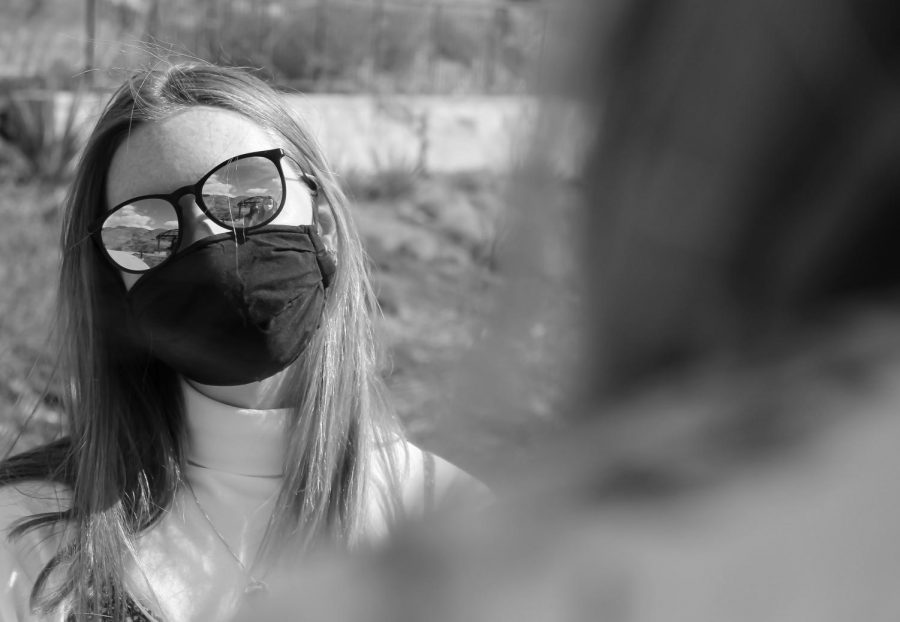Soter: Feeling Socially Awkward Lately? Blame the Pandemic
Interacting face-to-face with masks on. (Photo by Hailey Danielson | The Daily Utah Chronicle)
April 2, 2021
For the most part, I like people. I like to be around them and hear their stories; I like to tell them mine. Of course, I get nervous before going to a party with strangers or a first date with someone who gives me butterflies, but cases like these are the exception, not the norm. I like people. Or at least I did.
Now, though, as the apocalyptic reality in which we’ve lived for the last year starts morphing back into the one we once knew, I’m realizing that the extroverted and outgoing person I was won’t be there when I get back to normal life. I’m different now. I get nervous to talk to the barista at my local coffee shop and I race to the self-checkout line at the grocery store. So it’s no surprise that I haven’t initiated plans with people outside of my home since March 2020.
Worse than all of that, though, is that I’m realizing I like my isolation — so much that I’m dreading a post-pandemic reality. It’s comfortable here. I don’t have to search for conversation, the perfect outfit or even an outfit at all. I don’t want normal back, and I know a lot of people who feel the same way. Basically, COVID-19 ruined our reality and then forced us to love the bleak one it left in its wake. But if I can live through a pandemic, I’m confident I can live through its aftermath — and you can too.
It’s important to note that the anxiety that comes with re-entering the world isn’t as severe as diagnosed social anxiety, which the National Institute of Mental Health defines as “an intense, persistent fear of being watched by others.” Pandemic social anxiety isn’t a mental disorder. This means that it was caused by something other than biology and can be cured. Nonetheless, pandemic social anxiety is a very real and very unpleasant challenge. In fact, almost 50% of adult Americans are feeling uneasy about returning to a “normal” reality, and that anxiety isn’t sprouting from the virus alone. 48% of people who have received the COVID-19 vaccine are still feeling nervous about the fast approach of a pre-pandemic reality.
In a lot of ways, pandemic social anxiety makes sense. We have been largely unable to interact with people for the last year due to the potentially fatal disease that lingers all around us, so it’s no wonder our conversation skills are a little rusty. But on top of forgetting how to converse, we also have little to converse about. Little has happened in many of our lives that we feel the need to talk about. While that might sound ironic considering that living through a pandemic is an undeniably “big” thing, it’s also ubiquitous. And on top of all of that, we’ve formed habits. We’ve adapted to this world where human interaction puts our lives at risk, so it has rightfully become our instinct to stay away from people. Now, we have to break our habits and retrain our minds to know that safe interaction is okay. In fact, it’s good.
Thankfully, the human brain is nothing if not retrainable, meaning that there are plenty of ways get out of your post-pandemic funk. A good place to start is to recognize that stress about re-entering the world is normal. For a whole year we’ve been told not to interact, and now that the vaccines are here, we can. That rapid reversal is anxiety-inducing in and of itself.
That said, we can’t wallow in our pandemic anxiety forever — we must push past it. One way to do that is to set rules for yourself that push you out of your comfort zone slowly and safely. For example, wait to be fully vaccinated before your big debut back into the social scene, and make sure that when you do you are only seeing people who are also vaccinated. Another strategy to try is to make sure that the people you see are people you want to be seeing — people you love and feel comfortable around. Chances are that it won’t be as bad as your brain might make it out to be. And until vaccines are secured, push yourself in little ways, like asking your barista or cashier how their day is. What do you have to lose?
Pandemic social anxiety is justified, and even normal — but we deserve better than to let it win. COVID-19 has already taken a year of our lives from us. Let’s not let it take anymore.









